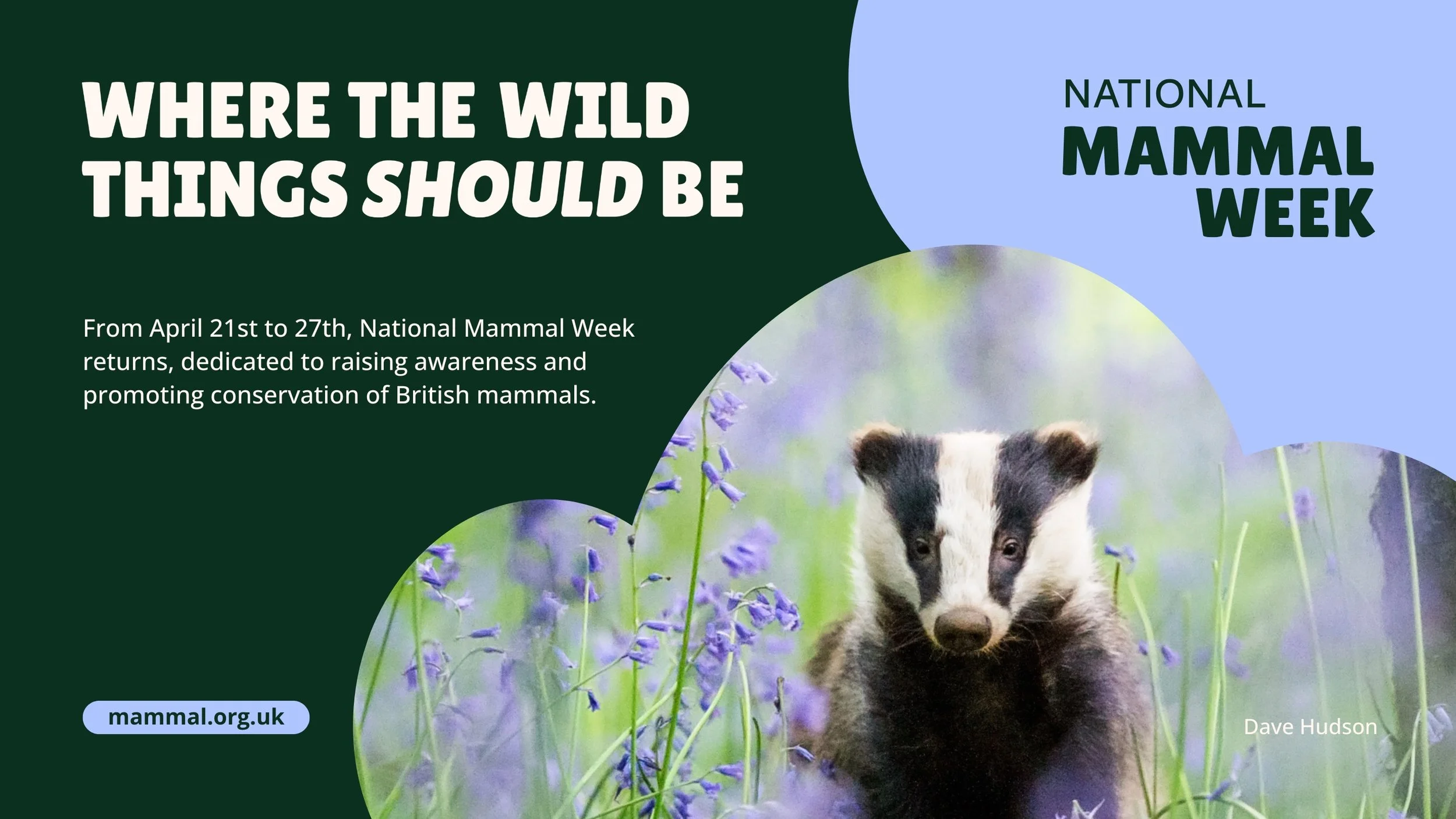Conservation charity uses National Mammal Week (21-27 April) to highlight 'untapped potential’ for wildlife in UK landscapes
National Mammal Week, led by UK science charity The Mammal Society, is a celebration of Britain’s mammals and an opportunity to raise awareness of the challenges they face.
National Mammal Week 2025 takes place from the 21st-27th April 2025 and is an opportunity to celebrate the wild mammals of the British Isles and Ireland, as well as those working to protect them. The UK is a nature-depleted country, with a quarter of our native mammals at risk of extinction and many more in decline. Due to the elusive nature of mammals, much of this decline takes place out of sight, leading to challenges with monitoring and accurately assessing populations. This can mean that some species could decline to critical levels before the causes of their declines can be recognised and addressed. Grassroots action and citizen science monitoring schemes are thus critical to help monitor and conserve our mammals.
This year, National Mammal Week’s theme is Where the Wild Things Should Be, which highlights how much wilder our nature-depleted landscapes should be – and how everyone can play a role in restoring them. Farmland, urban landscapes and infrastructure can all be designed and managed in a nature-friendly way, allowing wildlife to thrive alongside humans. Currently, there are many missed opportunities to do this, such as the excessive mowing of verges and gardens in urban areas, or the removal of hedgerows and wild field-edges and use of pesticides in farming landscapes. This lack of 'ragged edges' in our landscape squeezes out the mammals that would be improving soil quality and drainage, keeping insect populations in balance, and sustaining a wealth of other important wildlife, such as birds of prey.
"Recently, there has been a worrying trend in politics and media of holding up nature as a blocker to development,” stated Matt Larsen-Daw, CEO of the Mammal Society. “But it is possible for both human needs, and the needs of wildlife, to be met in the same landscape, and both nature and people can benefit when this is the case. Wild mammals are essential for healthy, resilient landscapes, as well as being iconic and charismatic animals with an important place in our culture and history. If we design and manage landscapes in a way that excludes and blocks our wild neighbours, we lose more than our natural heritage, but our hopes of a sustainable, stable future."
The Mammal Society is calling for people to look for the opportunities in their own local landscapes for mammals to be better supported, whether it is through nature-friendly gardening approaches, the installation of bat boxes and hedgehog highways, or by calling for local council to leave patches of long grass in streets and parks. They also call for infrastructure projects and policies around planning and agriculture to consider the needs of mammals and all wildlife.
Through a series of engaging events, educational activities, and community initiatives, National Mammal Week offers a unique opportunity to learn about the importance of mammalian biodiversity and the urgent need to protect it. In particular, the Mammal Society’s annual Mammal Discovery Challenge encourages citizens to record mammal tracks and signs on the free Mammal Mapper App to help gather data about the state of wild mammal populations across the British Isles.
The campaign advocates for the return of Britain’s wild mammals to the places they once roamed and raises awareness about the critical need to make space for nature in urban spaces, rural areas, and beyond. The Mammal Society invites everyone to participate in restoring the balance of nature and ensuring wild mammals can thrive where they should be: in our communities, landscapes, and hearts.
“This National Mammal Week, we are hoping to encourage people from all walks of life to reconnect with the nature around them,” said Alana Scott from the Mammal Society. “With a quarter of our native mammals at risk of extinction, it’s especially important that we record, reconnect with, and create environments for our mammals to thrive. This can include building ‘hedgehog highways’ in suburban environments or planting habitats such as wildflower meadows for our small mammals like shrews and voles.”
Editor’s Notes:
The Mammal Discovery Challenge encourages everyone to record any signs of wild mammals that they find (i.e tracks, sightings, droppings) on the Mammal Mapper App from the 21st-27th April 2025. Participants can also submit signs they are unsure of to the Mammal Discovery Challenge Facebook group, where an expert can help them to identify the sign.
The Mammal Mapper App can be downloaded for free from the IOS or Google Play store.
See here for links to assets for National Mammal Week, including logos, graphics, species photos, and branding guidelines.
About National Mammal Week:
National Mammal Week 2025, brought to you by the Mammal Society, is a celebration of Britain’s mammals and an opportunity to raise awareness of the challenges they face. From April 21st to 27th, the conservation sector, volunteers and nature-lovers come together to celebrate these remarkable creatures and raise awareness about their conservation. Through a series of engaging events, educational activities, and community initiatives, National Mammal Week offers a unique opportunity to learn about the importance of mammalian biodiversity and the urgent need to protect it. Whether you're exploring local habitats, attending informative workshops, or participating in citizen science projects, there's something for everyone to enjoy during this week-long celebration.
About the Mammal Society:
Established in 1954, the Mammal Society is Britain’s leading charity devoted to the science-led conservation of mammals. They work to raise awareness of the issues mammals face, sharing scientific research so that populations can be protected and restored across the British Isles and Ireland. Ensuring a bright future for British mammals, the Mammal Society inspire conservation projects, empower stakeholders through training and resources, and raise public awareness through education and campaigns.

